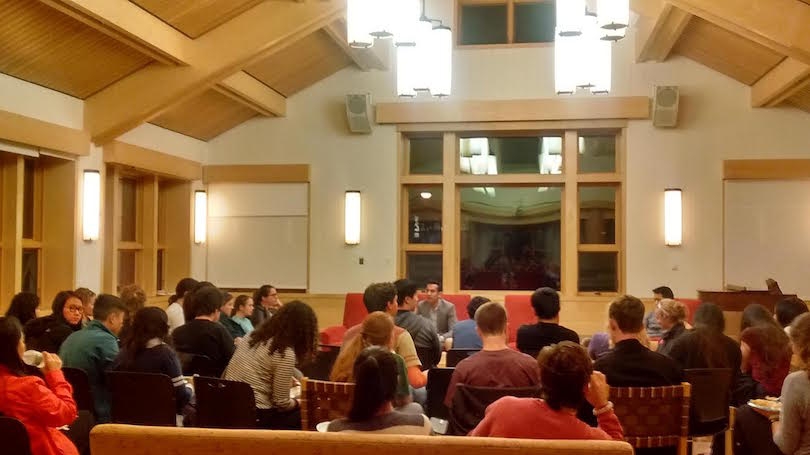
- Public Policy
- Leadership
- Funding
- News & Events
- About the Center
Back to Top Nav
Back to Top Nav
Back to Top Nav
Back to Top Nav
At The Thought Project’s “Food for Thought Dinner” with Professor Sonu Bedi, students were challenged to critically examine the existing political and social norms surrounding marriage in the US and to question what role the State should play in sanctioning relationships. Professor Bedi raised the question, why should the State reward one particular, romantic form of relationship, as exists in marriage, and not recognize a non-romantic, loving relationship between siblings with the same benefits?
This discussion topic was thought-provoking and controversial; during the open discussion portion of the evening, several students expressed differing points of view on the topic of marriage, some supporting and some disputing Professor Bedi’s argument that the legal sanctioning of romantic relationships over different types of relationships should be abolished. The energy in the room was electric as students engaged deeply with each other, with Professor Bedi, and with these big questions.
Students in the audience were not afraid to bring up ideas counter to Professor Bedi’s controversial views. Several times during the dinner, Professor Bedi explained that many arguments used in support of marriage as an institution are similar to those used against gay marriage. Appeals to tradition and history, he explained, were not strong enough arguments to support the continued existence of marriage as a relationship with special privileges from the state.
One student raised the idea of every American citizen choosing a “+1” rather than a spouse. Your “+1” could receive the legal benefits that come along with marriage, without necessarily the expectation of a romantic relationship. You could choose your best friend or your sibling to be your “+1,” for example. Professor Bedi thought that such a system might be a good alternative to our current state of affairs, and we discussed some of the complications that might go along with the “+1” system. Professor Bedi is in the midst of writing a book about this topic, and it was exciting to learn about scholarship that has not yet been published.
This dinner was a valuable experience for students because it afforded them the chance to grapple with the ‘big idea’ of marriage - an institution that plays a significant role in our social structure and in our political arena - and to engage with their peers and with an accomplished faculty member outside of the classroom. The discussion bolstered students’ curiosity and introduced them to new ways of thinking -- in fact, of the 28 students who replied to our Reflection Survey, 96% of them said the dinner had introduced them to new ideas, and 65% indicated that they left the dinner wanting to learn more about marriage through their own research.
- Submitted by Margaret Cross '19, Rockefeller Mini-Grant Recipient
The Rockefeller Center's Mini-Grants program funds registration fees for students attending conferences, as well as the costs of bringing guest speakers to Dartmouth. The views and opinions expressed here are the author’s own and do not necessarily represent the views and opinions of the Rockefeller Center or constitute an endorsement by the Center.